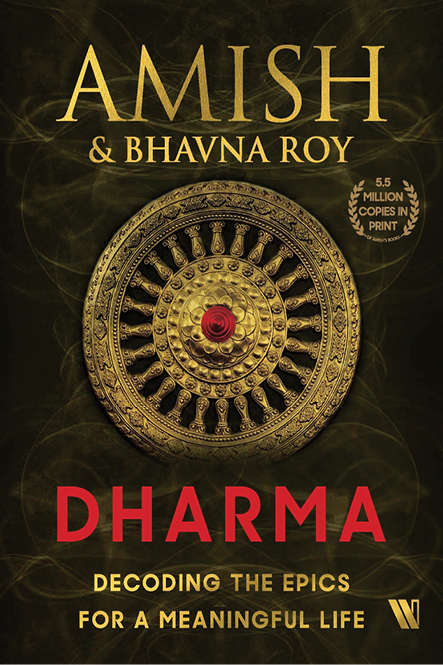In their new book, Dharma: Decoding the Epics for a Meaningful Life, Amish and Bhavna Roy explore the idea of dharma and its interplay with karma, love and sacrifice. The authors explain how dharma lets us make our own choices and live with the consequences, adding that “dharmic religions treat human beings like adults.” In a freewheeling interview with The Daily Guardian, Amish and Bhavna Roy tell us more about the book, how our epics can help us lead a meaningful life, and why idol-worshipping cultures are innately liberal. Excerpts:
Q. How did the idea of writing this book come to you?
Bhavna Roy (BR): The project started around 2013-14. By that time, my brother Amish’s three books had been released. We are a talkative family and every dinner table conversation begins at philosophy and ends, nine out of ten times, at philosophy. One evening while talking about Amish’s stories and the philosophies behind them, we started discussing idol worship. At that time, Anish (another brother) suggested we write a book on the philosophical basis of idol worship. I wrote around 20 pages and forwarded them to Amish, who transformed those 20 pages with his magical touch. He turned the initial thinking of mine into conversations, vibrant and exciting. He sent them back to me, and this exchange and counter-exchange happened for some time. Then it went into cold storage for four or five years. During the lockdown, Amish showed his desire to restart the project, and here we are with this new book.
Q How was your experience of working with Amish, the celebrity author?
BR: Honestly, it was as smooth as butter. We were on the same page. There were times we disagreed on something, but we would talk and sort them out. We have a good working relationship. When he forms the structure, I add flesh and mass to it—and vice-versa. It was a lot of fun.

Q. This book deals with different aspects of dharma, a very complicated subject otherwise. You mention the dharma of Bhishma, Karna and Kumbhakarna; they all were pursuing their dharma and yet not doing the right thing. So, what is dharma, after all?
Amish (A): It is complicated. The philosophy at the heart of the Indic religions—be it Hinduism, Buddhism, Jainism or Sikhism—is dharma. There is another approach, which is the commandment way, in which you are told that, if you do things in a certain way, you will go to heaven, and if you don’t, then you’ll go to hell. I’m not saying one way is better/worse or right/wrong than the other. They’re just two different ways. But one approach treats human beings as children who have to be constantly guided and the other approach, which is the approach of the Indic religions, treats human beings like adults. Dharma essentially tells you about the options, the philosophies. It lets you make your choices and live with the consequences. So, there is no one to blame, whether God or parents, as it’s all about individual choices. All decisions, positive or negative, are made by that particular individual, which means that we are treated like adults. We Indians are naturally more comfortable with being treated like adults. We are a rebellious race, so dharma works for us.
Now, if we›re being treated like adults, then the keyword that comes in addition to dharma is “vivek”. Like dharma, this is also an untranslatable word. It means the ability to distinguish, the ability to be wise, and the ability to see the context in a situation, because only when you understand these things, you will make a mindful decision. Whatever decision you may take, there can be positive and negative results. It’s the nature of life. So, dharma is something that will need constant exploration; there is no simple list of dos and don’ts. You can say ahimsa is good but it depends on the context. For ordinary citizens, ahimsa is good, but for a soldier on the border, hinsa is also dharma at times. Is respect good? Again, it depends on the context. If someone is worthy of respect, you must treat him with respect. If someone is not worthy of respect, you should still speak with him politely, but you should do what you think is right. Even if a person is older and if he’s demanding something adharmic, then you must refuse. The story of Bhishma Pitamaha is a perfect example.
Q. At one point in the book, there is a discussion around Gandhari’s sacrifice and dharma. Her sacrifice is called the blind sacrifice, whereas Bhishma’s sacrifice is called an act of self-indulgence. Can you explain?
BR: For a moment, let’s counterfactually imagine that Gandhari maa had not decided to blindfold herself. Then what would have happened? A dharmic woman, dutiful wife and loving mother, she would have been able to better advise her husband who was born blind and better guide her son. She would have been able to advise her sons more intelligently, with more discernment and vivek. But she chose to sacrifice; she chose to blindfold herself to her husband’s overarching ambitions, her son’s all-encompassing envy, anger, and wrongdoing. Had Bhishma Pitamah not chosen to submit himself to his father’s desire to get married again, he would have been a very good king, an excellent husband and a fantastic father. Having chosen to do what he did, was this the best that he did? I really don’t think so.
Q. Bhishma’s sacrifice is invariably projected in a glowing light. But your book opens a new perspective to this. Tell us more.
A: The key point in the field of dharma is that if you’re selfish, then you cannot be close to dharma. But even if you’re self-sacrificing, it should not be for projecting your individual ego. You have to see the consequences of your actions on those around you. If Bhishma had been honest with himself, he would not have ignored the fact that he would make a very good king and a king’s duty in the Indian way was not to himself, it was to his people. For example, in the Middle East and the West, all public land was owned by the king, but in India it was not the case. A king’s duties are to his people, he exists to make sure that his people are served better. So, the question is: Did Bhishma actually hurt his people by not taking up the responsibility of becoming a king? Then was that sacrifice dharma, because others got hurt? Maybe the Mahabharat war itself, as we have discussed in the book, would not have happened had he become the king. All of us are blessed with a talent, and it’s our duty to find it and then be good at it and use it for the good of the community. That is dharma.
Q. The book has come at the time of a pandemic. Lots of people have died and you had a difficult time personally as well. How did you deal with it?
A: I always believe that it’s not the grief that paralyses you; it’s your inability to handle the grief that paralyses you. Yes, of course, it has been a difficult phase. One can say the glass is half empty. One can also say the glass is half full. As I face my personal grief, I am also aware of many other people facing far more difficult situations. I look at the lives of Arjun and Karna to know how I should react to difficult situations. Karna constantly keeps looking at how life has been unfair to him and resents it. Arjun, on the other hand, looks at where life has been more than fair to him and is grateful for that. All of us have Karna and Arjun inside us, all of us have things which we can be resentful of and things we can be grateful for. So, am I missing my family? Terribly, of course. I’m alone in a cold, different, alien city. I can be resentful about this. But I can be grateful for some things: I’ve made friends here, I’m having a new experience. As we explained in the book, it’s only Arjun who can defeat your Karna, it’s only your gratefulness for the things that you have been blessed with, which can blot out the time when life has been unfair to you.
Q. You have interesting characters in the book like Karna, Goddess Kali, Ravan and Lord Ganesh. They all have their own share of problems, but they dealt with them so differently.
A: Our life is not defined by the events that happen to us; it is defined by how we react to those events. As I said earlier, everyone faces their share of grief and suffering, but how we react to it defines how our lives will be. If you see the lives of Karna, Ravan, Goddess Kali and Lord Ganesh, it is fair to say they were treated unfairly by life. Ravan reacted with anger, hatred and rage, and he made the situation even worse for himself. Goddess Kali also reacted with rage but there were at least some boundaries that she would not cross. Karna, in his resentment and rage against how the world had been unfair to him, failed to see how much his own karma became negative due to his attachment to Duryodhan; his attachment to Duryodhan was driven by his resentment and anger at how the world had treated him. Lord Ganesh, on the other hand, had every reason to be angry and resentful with life. Till he met his mother, he genuinely believed he’d been abandoned. Life was unfair to him, but he ended up having a positive impact on others. That’s something we can learn from Lord Ganesh. All of us face unfairness in life. It’s up to us to flip that, not to get angry and resentful, but actually give to others what we didn’t receive.
Q. In the book, you deal with the concept of diligence versus negligence. Can you talk more about that?
BR: Diligence is conscious living. It is effortful. It is not easy to be effortful, day after day, minute after minute. It is so much easier to be effortless. The fruit of effortfulness is growth over a period of time. Every day you try to be a little better than you were the day before. How do you do it? Small things like ensuring that you wake up at six o’clock and without exception, today, tomorrow and the day after, that you will not sleep for an extra minute, doing exercise, doing your work; if you do not have work then generating work because there’s value in work. You need to live with rhythm. You have to learn from nature. The sun is just so diligent. Can you imagine waking up one day when the sun forgets to rise? The sun will never forget because it practises diligence. The thing with being a hero is not that you fall, but that you get up every time you fall. When we strive to be heroic, we strive to tap into the divine in us. That is beautiful.
Q. You talked about working on a book about idol worship. What happened to that? Are we going to see that project anytime soon?
BR: The manuscript around idol worship needs some more work, but the basic structure is ready. Hopefully, it will be out soon.
A: We want to explain the beauty of idol worship. We will explain why the concept of idol worship is so beautiful. Over the last 1,500 to 2,000 years, the so-called idol-rejecting cultures went around the world massacring hundreds of millions of people simply because they worshipped idols. Entire civilisations were destroyed. Tons of universities were razed to the ground, countless books were burnt, tens of thousands of temples were destroyed, not just in India, but across the world. Most of the ancient world was idol worshipping. India happens to be among the few that have survived. Interestingly, there are almost no case studies of the idol-worshipping culture massacring others. One needs to ponder over this. There is something innately liberal that gets engendered into you if you worship an idol; it comes almost instinctively. That’s what we want to explain—the beauty of idol worshipping.







